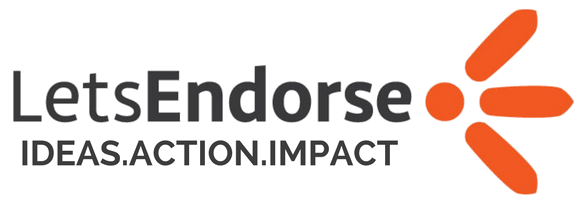Let’s get to the point. Everybody talks about change. Mind you not only the miniscule ones, but the really drastic, influential changes, which would take the nation by a storm and bring the holistic appeal everyone wants out of life. Now, let’s face this. How many of us are willing to actually work for that change? By standing up, collaborating, giving back and helping each other create the change we’re striving for?
The world is competitive. So are you. You want to be the mega-qualified individual, with a super career on the go, and live with flair; you want to attain heights unheard of, and you want the limelight for yourself. Fair enough. But living in a community, and expecting it to further your personal growth without investing in it seems to be a myopic thought; an insulation which would isolate the individual from the sense of belongingness towards the society.
One day we see Craig Newman saying- “It’s not altruism, it just feels right.” and connect the dots with the very famous one by Churchill- “You make a living by what you get. You make a life by what you give.”
No matter how busy an individual is, however caught up by the constant rat-race, it is always possible to give back. Giving back means standing up for some cause for the sole reward of the realization that it has significantly affected a positive change.

Giving back to the community can always begin NOW. It doesn’t have to be warded off for the day after, or the near future, or simply because it’s too late to start now. It does not entail losing focus towards the desire to be accomplished, and straying away from thriving successfully. It simply means learning the art of accommodating and settling for a lifestyle which allows us to not immerse ourselves in the run for financial stability, but to understand and appreciate the fact that there are people way more challenged than us out there, and as a community, it should be our prerogative to help the lot.
Being philanthropic, or having a genuine concern for human welfare and advancement, should basically be a way of life, especially in a country like ours.
It is important to note that philanthropy is noticeably different from charity, because charity focuses on eliminating the suffering caused by social problems, while philanthropy focuses on eliminating social problems. The idea is to inculcate the fact that giving back cannot end at charitable causes; greater the inflection towards philanthropy, better would the social issue be handled, right from the grassroots level.
(Source: LiveMint) “I firmly believe that from time to time we must take a step back from the bustle of our day-to-day lives and introspect how our country is being shaped, and ask ourselves what our own role is in that journey”, says Amit Chandra, Managing Director of Bain Capital Advisors, and board member of various leading companies and NGOs. What he insists upon is the fact that notwithstanding our economic or social status, each of us have the capacity and potential to be the change we want to see.
True philanthropy begins as a way of life, and not a foregone conclusion as a one-time investment. The amount hardly matters, rather it is the month-on-month commitment, which makes a charitable cause truly philanthropic. Says T.V. Mohandas Pai (chairman of Manipal Global Education Services): “Philanthropy is an obligation. It means that all of us contribute to the greater social good and leave a world behind which is much better than the world that our parents gave us.” (Source: LiveMint)
Here are some of the reasons why giving back to the society is important, and why being philanthropic should be your way of life- not out of pure altruism, but because it is a moral responsibility for every individual living in a society.
1. It is the right thing to do.
If you are fortunate enough to pay for the clothes on your back and the food in your stomach, it should naturally be right for you to extend a hand to others who haven’t experienced that good fortune yet. Giving back to the society is a great thing to do. Not only does it restore faith in humanity, but also reminds us how it is our social responsibility to engage in the progress of our community. There are a wide variety of needs in our communities that require our help. Serving those in need not only helps them, but also creates a sense of peace in the person rendering those services. A little generosity, a few acts of kindness, and a little compassion can create a beautiful world for everyone and truly go a long way.
2. Bringing changes in the society
It’s time we act upon the proverbial “Be the change you want to see.” There is so much deprivation all around; poverty and oppression is forever on the rise. To do our bit for the society individually and collectively, would bring a whole lot of change to those lives which are deprived of the basic necessities. It does not require you to be an entrepreneur of the scale of Zuckerberg to donate. Feeding India, for example, is a youth run not for profit organization that works to end Hunger and Malnutrition, and has been doing excellent work in the field, with support from individuals and groups. Philanthropists Nandan and Rohini Nilekani have prioritised their philanthropy into areas such as water, governance and education. Such philanthropic activities have made sure that social issues are properly addressed to, and not merely shoved aside by irregular donations.
3. It’s meaningful.
Whatever cause you choose to get involved with, you are spending your time in a way that makes a real and meaningful impact in the lives of others. Philanthropic activities by people like Ronnie Screwvala (founder of media firm UTV) whose initiatives are housed under the Swades Foundation (UTV group), promotes rural empowerment through the use of best practices and modern technology values. His mission is to empower 1 million rural Indians every 5 years, creating a permanent, irreversible change for good, in order to develop a progressive rural community
4. Giving evokes gratitude
Whether an individual is on the giving or receiving end of a gift, that gift can elicit feelings of gratitude—it can be a way of expressing gratitude or instilling gratitude in the recipient, and research has found that gratitude is integral to happiness, health, and social bonds. These philanthropic exchanges also promote a sense of trust and cooperation that strengthens our ties to others—and research has shown that having positive social interactions is central to good mental and physical health.
5. Giving is contagious
When we give, we don’t only help the immediate recipient of our gift. We also spur a ripple effect of generosity through our community. Being philanthropic becomes a nature for those who give, as well as those around them, creating a network of known and unknown do-gooders, who care for the society. Examples are not hard to find. The case of Suhasini Mistry, a poor domestic help who set up a charitable hospital called Humanity Hospital in Hanspukur, Joka, West Bengal, is such a story. At 23, Mistry lost her husband (because they could not afford proper medical treatment) and had to fend for herself and her four children. The memory stayed with Mistry, and she decided to try and help people who may face similar difficulties. She did a host of odd jobs from cleaning dishes to selling vegetables, and managed to save Rs.20,000, while educating her son Ajoy Mistry to become a doctor with the help of some philanthropists. In 1996, with the help of some locals and her savings, she set up a small hospital, working out of a hut. Today, the hospital is run under the umbrella of Humanity Trust. As is evident, it doesn’t require an abundance of funds to be philanthropic, but a big heart.
The recent edition of Bain (India) Philanthropy Report asserts that philanthropy in India has the potential to soar in the next decade, with more than half a billion people giving for religious and charitable reasons each year. Writing a cheque is just the first step in a philanthropic journey. Impactful giving is a multidimensional activity that is different for each, shaped in part by his or her unique giving philosophy, life experience, time availability, social interests and goals. What is needed, though, is a widening of the community of givers, say experts. This is our chance.
Let’s just not be platonic givers- let’s be philanthropic. Let us take a pledge to create an equal society by creating equal opportunities. Because giving back is not altruism; it just feels right.


